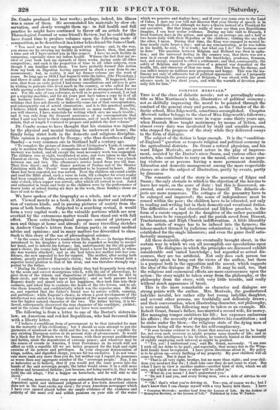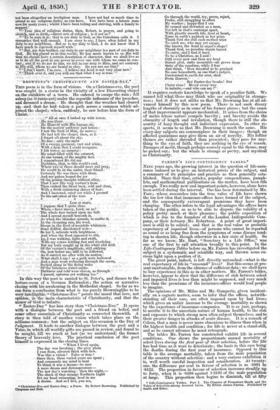COMPTON MERIVALE. * THIS is of the class of didactic novels;
not so pervadingly scien- tific as Miss Martineau's tales, illustrative of political economy ; not so skilfully impressing the moral to be pointed through the conduct of the general story and persons, as the founder of the di- dactic school, Miss Edgeworth, sometimes accomplished. Compton Merivale rather belongs to the class of Miss Edgeworth's followers ; whose numerous imitations were in vogue some thirty years ago, when Hannah More taught matrimony by means of fiction, and almost every duty was inculcated by staid and sensible persons, who stopped the progress of the story while they delivered essays in the form of dialogue.
The subject of the fiction is large enough. It is the "condition- of-England " question as respects religion and political economy in the agricultural districts. Dr. Grant a retired physician, and his ward Edgar Merivale, are great actors in the play of improve- ment, assisted by the Doctor's niece Susan, and various other cha- racters, who contribute to carry on the moral, either as mere pass- ing visitors or as persons having a more permanent domicile. Education and domestic management among the more respectable classes are also the subject of illustration, partly by events, partly by discourse. The romantic end of the story is the marriage of Edgar and Susan ; the only obstacle to which is the objection of the heroine to leave her uncle, on the score of duty : but this is discovered, an- swered, and overcome, by the Doctor himself. The didactic ob- jects are more numerous. The cottages of the peasantry have to be enlarged and improved; the sense of independence must be roused within the poor ; the children have to be educated, not only in reading and writing but in their domestic and vocational duties. The difficulties of a bad elocutionist and lifeless preacher, in the form of a curate engaged to the daughter of. the rather parsonlike rector, have to be vanquished; and the parish saved from Dissent, Tract:arianism, and High Church indifferentism. A little liberality in the article of wages has 'to be infused into the farmers ; the labour-market thinned by judicious colonization ; a lodging-house established for the single labourers ; and even the game itself satis- factorily managed. All these desirable objects are eventually brought about, in the certain way in which we can all accomplish our speculations upon paper. The dialogues in which the principles are discussed exhibit considerable and varied knowledge ' • but regarded as actual dis- courses, they are too artificial. Not only does each person too obviously speak to bring out the views of the author, but there is a purpose both in the opposition and the assent, which suggests the idea of the dialogue in The Critic. It may be said, too, that the religious and economical effects are mere excrescences upon the action : the story might be taken away from the philosophy, or the philosophy; from the story,- with -very little trouble, and really without much appearance of break.
This is the more remarkable as character and dialogue are strong points with the author. Mrs. Merivale, the goodnatured ladylike invalid, her rather silly but young ladylike .daughter, and several other persons, are truthfully and delicately drawn ; and their conversation, when illustrating character, not philosophy, is very natural. The following may be taken as an example. Mr. Robert Grant, Susan's father, has married a second wife, for money. Her managing temper embitters his life ; her expenses embarrass his affairs ; the necessity of stoppage shatters his constitution ; and he sinks under the blow,—the religious state of the dying man of business being all the worse for his self-complacency.
" It soon became evident to Dr. Grant that recovery was not to be hoped for, not even such recovery as might promise some months of life; and in breaking this intelligence to his brother, he tenderly hinted at the necessity of rightly employing such interval as might be granted. " Yes, yes ! I understand you,' said lir. Grant, nervously. am sure I wish all my debts to be paid ; and especially, that money due to the Wing- field family must be replaced. I have given directions about it. My policy is to be given up—every farthing of my property. My poor children will all come to want. But it must be.'
" That is all very right, brother, but no more than right ; and your chil- dren you need not fear for ; I shall take care they do not come to want. But what I have in view is another matter—another kind of debt, which we all owe, and which at one time or other will be called in.'
"'What do you mean ? I don't understand you.'
" ' Do not I and you, and every living man, owe a debt of service to our Creator ?'
" 'Oh ! that's whatyou're driving at. Yes—yes, of course we do but I don't know that I can charge myself with a very heavy debt there. I have • Compton Merivale ; another Leaf from the Lesson of Life. By the Author ,of " Brampton Rectory, or the Lesson of Life." Published by John W. Parker. not been altogether an irreligious man. I have not had so much time to attend to my religious duties as you have. You have been a leisure man- now for many years ; whilst I have been toiling and striving, with a family to support.
"'Your idea of religious duties, then, Robert, is prayer, and going to church, and so forth,—direct acts of religion - is it not so " To be sure it is; that is our duty to God, as the Catechism calls it. I remember that well enough. I am sorry to say, I have often failed in my duty. to my neighbour. But as to my duty to God, .1 do not know that I have much to reproach myself with.' as,placed us in this world; He has made known to us Alis will " lt,„ray. dear brother, our duty to our neighbour is a part of our duty to
that weshould have a certain description of character, that we shall live so as to 'do all the good in our power totevery one with whom we.ceme in con- tact •, and g we ,do,not do this, we fail in our duty to Hun, and act contrary f% 4(1141,r:tram bound ta obey. Do you =taw this?' on t know, Pin sure. I believe my head is not very clear now.' " ' Think over it, and you wift, see that -what I say is true.' "



























 Previous page
Previous page